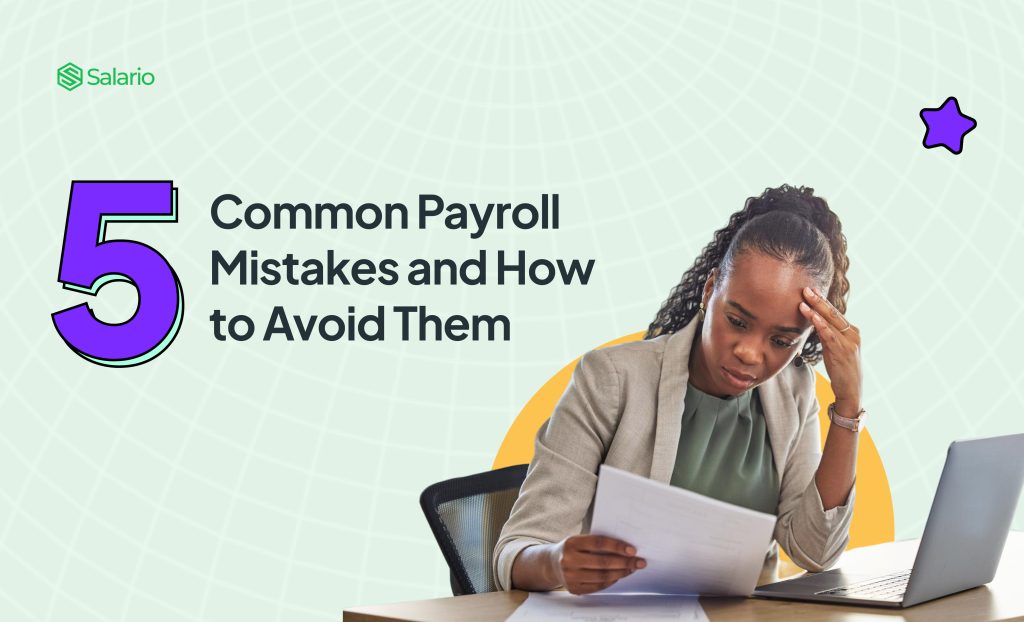
Introduction
As someone who pays out salaries, the worst thing that can happen to you is an error that jeopardises someone else salary, and you now have to pay for the error later (that is, if you have not been sued)
Things get worse if it is an error you could have simply avoided by being a bit more proactive. While you might be an expert at your job, and we don’t fault your expertise, clarifying the basics once again can go a long way in making life easier for everyone on either side of the payroll table.
To this end, we have curated some of the more common payroll errors that business owners, HRs, finance managers, and anyone who pays out salaries might make. To be honest, it was not as difficult a task, as these errors are so common, yet so recurring.
Who are We?
At Salario, we strive to ensure that employers and employees do not meet at the end of the month with groanings and complaints on payroll matters. We help employers process payroll with ease and employees track their salaries without stress.
We have designed a system and an app to make payroll disbursement, benefits, earned wages, and record-keeping simple and effective. Plus, for employees, our apps help you spend on your day-to-day expenses directly from your portal without the need to move money around too much.
So, you can trust that we want the best for both sides of the payroll table, and this simple guide to common payroll errors is another step to make the jobs of business owners, HRs, finance managers, and anyone who pays out salaries easier.
Five common payroll mistakes and how to avoid them.
1. Misclassifying Workers
One of the most frequent payroll mistakes employers make is misclassifying workers, which can lead to compliance issues and unexpected financial liabilities. In Nigeria, employees and independent contractors have different tax obligations, benefits, and entitlements under labour law.
For instance, an employee is entitled to benefits such as pension contributions, health insurance under the National Health Insurance Scheme (NHIS), and leave allowances, whereas an independent contractor is not. However, some businesses mistakenly classify full-time workers as independent contractors to avoid these obligations, which can result in legal disputes and penalties.
How to Avoid It
- Understand Nigerian labour laws—the Labour Act and other relevant regulations define employee rights and classifications. Employers must familiarise themselves with this law.
- Clearly define work relationships — Ensure contracts explicitly state whether a worker is an employee or an independent contractor based on their job scope, responsibilities, and benefits.
- Use a payroll system —payroll solutions like Salario can help classify workers correctly and ensure proper deductions, preventing errors that could lead to penalties.
2. Miscalculating Overtime
Many Nigerian businesses fail to accurately compute overtime, leading to disgruntled employees and potential disputes. The Nigerian Labour Act stipulates that workers who work beyond the normal hours are entitled to overtime pay, usually at a higher rate than their regular wage. However, some employers either underpay overtime or fail to compensate for it altogether.
How to Avoid It
- Track working hours properly —implement time-tracking tools to accurately record employees’ working hours and ensure fair compensation.
- Know overtime rules — While not all employees qualify for overtime, businesses should ensure that non-exempt employees receive appropriate compensation for extra hours worked.
- Automate calculations —payroll software like Salario can automatically calculate overtime, reducing the risk of underpayment or overpayment.
3. Non-Compliance with Payroll Laws
Payroll laws in Nigeria cover areas like income tax (Pay-As-You-Earn or PAYE), pension contributions, health insurance, and employee compensation schemes. A common mistake employers make is failing to deduct and remit the right amounts at the appropriate time, leading to penalties from regulatory bodies such as the Federal Inland Revenue Service (FIRS) and the National Pension Commission (PenCom).
How to Avoid It
- Stay updated on regulations – Laws and tax policies change frequently. Employers must stay informed about updates from government agencies like the FIRS and the Joint Tax Board (JTB).
- Deduct and remit taxes on time — PAYE tax, pension contributions, and other statutory deductions should be remitted to the relevant authorities within stipulated deadlines to avoid fines.
- Use a compliant payroll system —automating payroll processing ensures accurate deductions and remittances, helping businesses remain compliant effortlessly.
4. Overlooking Fringe Benefits
Fringe benefits such as meal allowances, housing, transportation, and bonuses can attract tax implications in Nigeria. Some businesses either fail to report them properly or do not account for their tax liabilities, which can lead to compliance issues.
How to Avoid It
- Understand taxable vs. non-taxable benefits – The Personal Income Tax Act (PITA) provides guidelines on taxable fringe benefits. Employers must make sure they categorise these benefits correctly.
- Properly document all benefits —every benefit offered to employees should be recorded in payroll reports to ensure transparency and compliance.
- Use payroll software for automated tracking – A payroll system like Salario can track fringe benefits, ensuring accurate taxation and proper record-keeping.
5. Missing Payroll and Tax Deadlines
Failing to process payroll or remit taxes on time can attract significant penalties from Nigerian tax authorities. It can also damage employee trust and morale, leading to dissatisfaction and reduced productivity.
How to Avoid It
- Set reminders and automate payments — Use payroll software to set up automatic salary payments and tax remittances to avoid missed deadlines.
- Keep proper records – Maintain accurate payroll records for tax filing and audits, ensuring all transactions are well documented.
- Work with payroll professionals — If payroll management becomes overwhelming, outsourcing to experts or using payroll platforms like Salario can help businesses meet their obligations on time.
Conclusion: Get Payroll Right with Salario
Payroll errors can be costly, time-consuming, and damaging to employee trust. However, avoiding these mistakes is easier when you have the right system in place. Salario offers a seamless, automated payroll solution tailored for Nigerian businesses, ensuring compliance, accuracy, and efficiency in salary disbursements, tax deductions, and employee benefits management.
Don’t let payroll errors cost you time and money. Simplify your payroll process today with Salario. You can book a personalized demo where our team of experts can help you provide the best solution to your payroll challenges.
